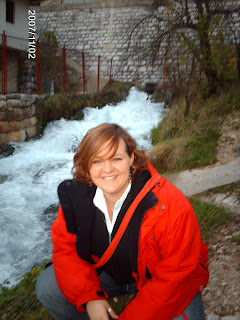You know you're a Bosnian when:
- you drive VW Golf 2 diesel
- your family owns a manual coffee grinder
- you take your shoes off when you enter the house, and every family member has his/her own slippers (plus some extra for the guests)
- your neighbour comes over every day uninvited, for coffee
- your father wears striped pajamas
- you drive VW Golf 2
- your day revolve around coffee and cigarettes
- you have 17 consonants and 2 vowels in your last name
- your mother/nena won't accept the fact that you're not hungry
- you drive VW Golf 2
- you have "pita" for dinner at least 4 days a week
- you have "sarma" for dinner the remaining 3 days
- a loaf of bread is eaten for lunch every day
- you're 6 and your father sends you out to buy him "Drina" and "Sarajevsko"
- you drive VW Golf 2
- you don't speak to your cousins who support "Sarajevo" (football club)
- when your nena insists you eat something with "kasika" at least once a week
- you chop up some onions and then decide what to cook for dinner
- your mother insists that "promaha" will kill you
- you drive VW Golf 2
- your mother tells you not to sit on the concrete slabs, or your ovaries are going to freeze
- your mother tells you to wear "potkosulja", no matter what the temperature outside
- your mother tells you not to sit close to TV, and not to use cell phones, because you'll get brain tumor
- you drive VW Golf 2
- your mother tells you that you'll get sick from drinking cold water
- you bathe only once a week
- your parents tell you that they had you, AND your sister/brother when they were your age
- a couple of days really means a week or so
- your parents have "goblene" on their walls, and "heklivo" on every piece of their furniture, including the TV
- your parents make "zimnica" every september
- your mother threathens you with "samo cekaj dok ti se babo vrati kuci"
- you spend all your family vacations in Neum
- you drive there in your family Yugo towed behind a donkey
the donkey you own is faster than the car you drive - you begin most sentences with "j. ga", "svega mi", or "Tita mi"
- your young cousin doesn't know what "Tita mi" means
- you can't explain what "ba" means, but you use it all the time (what's up ba etc.)
- you're the only one who gets all the Mujo and Haso jokes
- you know the entire script of "Walter brani Sarajevo" by heart
- you know the script of every single episode of "Top Lista Nadrealista"
- you despise your cousin who's going out with an "unproforac"
- you drive VW Golf 2
- your mother bakes a cake without oil, sugar, eggs, or flour, and she calls it "a war cake"
- the time is divided into "before" and "after" the war
- your father refers to all politicians with "djubrad", "lopovi", "kriminalci" and "krmad"
- you have at least one best friend from high school who went to "their side" and you still can't explain it to yourself, your remaining friends from high school live in Australia, Norway, Germany, and Malaysia
- you don't want to talk about the war to anyone, but that's the only thing you talk about with other Bosnians
- you have at least three passports, and have lived in at least 4 countries in the last 12 years
- you vote for the same politicians over and over again, but when somebody ask for your opinion about them, you say "Lažljiva lopovska gamad!"
- you hear "Pamet u glavu" everytime you go out of the house!
- you drive VW Golf 2
- you have to walk to school, which is located 14 miles away from your village
- you blame all the nations problems on the Turks just like the Greek's.
- Your family owns enough guns to start a war.
- you put rakija on your feet every time you are sick
- you drive VW Golf 2
- Your first words were "Allaahhaamm"
- you throw all of your garbage into rivers and creeks(except the plastic bottles, you need to save those for heating your home)
- you don't care about the environment
- you stop in the middle of the road to pick up or drop off someone because it's convenient for you
- when you drive you smoke a cigarette, drink coffee, talk on your phone and stop at green lights in a car that puts out more pollution than most other countries.










